Latest Posts by weishenmewwx - Page 3
Stars of Chaos 杀破狼 Vol 1, Notes 2
Pages 86 - 146
More translation and cultural notes:

It’s obvious in Chinese that Priest just means “his eyes were red with hatred,” but really eloquently.
More under the cut.

Yup. Priest fit in a pun/joke related to male-exclusive anatomy, and it’s just really cute.


It’s a cute turn of phrase where Shen Yi is being appropriately humble as a servant of a prince, and Chang Geng is using the exact same phrasing but saying “I’m not a prince.” And it’s all very concise.

There’s this thing called 歇后语 which Pleco translates as “two-part allegorical saying” and is really just yet another type of cultural inside joke. They’re so fun.
This one is 老寿星上吊 — 活得不耐烦了, for those who can read Chinese. (The translation is pretty spot-on, too).



Yet another nice way to talk about death and the dead.

Yah. I had to look that up.

Stars of Chaos - All The Notes List
All The Seven Seas Books Masterlist
Stars of Chaos 杀破狼 Vol 1, Notes 1
pgs 12 - 81
Here are some notes from Stars of Chaos Vol 1. Some are quick translations that don't really matter in the grand picture, but which are really fun and clever and it would be so much better if you could just see and understand it right now!
Here they are:

More under the cut

Did any of you learn the Ballad of Mulan (poem)? Yah. That poem talks about the difficulty of determining a rabbit’s sex, especially when it’s running.



I think “equipped” could be the correct word, but I’ve never seen it used as a verb in this context. It just means he put the thing on.

You will see many, many “Yifu!”s from here on. It’s a non-religious “godfather,” closer to “adopted” or “sworn” than “god.”


Remember: in Chinese, it’s good to be old :)

It’s a 蛟 jiao, not a fancy 龙 long。

Chinese has the Best Euphemisms for death! My favorite is 驾鹤西去: fly on a crane to the west(ern paradise).
Stars of Chaos - All The Notes List
All The Seven Seas Books Masterlist
Stars of Chaos 杀破狼
by Priest, translated by Seven Seas
Notes & Annotations List (by me)
I am truly impressed that Seven Seas had this translated. Major kudos to the translators. Maybe it’s just me and my not-advanced Chinese reading level, but I find the writing style of Stars/Priest-in-general to be extremely …. Juicy. Rich. Savory: if there is a 4-word phrase concisely describing something elaborately and with deep historical context, Priest will use that phrase. If Priest can refer to Character A in a manner that immediately conveys Character B's feelings and emotions about that Character A, she will use that reference style instead of any simple name or pronoun.
Sadly, none of those idioms or reference styles translate well into English.
For me, reading Priest in Chinese is like reading an epic story off a wall mural in an ancient temple, but add jewels and engravings and some filigree in precious metals, and maybe leave some imperial armor and weapons lying around to trip over while trying to decipher some crazy-long sentence punctuated only with commas, no periods or semicolons or even long dashes in sight. It's amazing, but sometimes exhausting, and especially exhausting if I finally puzzle my way through a truly difficult passage only to realize "Ah. Chang Geng is theorizing about the potential short vs long-term consequences of different types of monetary policy. Sarcastically."
Anyway, here are some notes. A few are literal translations that you would have gotten two sentences later; a few are of wordplay that I really enjoyed but which didn't survive translation. A fair number are translations that you could have looked up in the glossary, but, really, who wants to spend their time looking up "shifu" vs "shishu" for a minor unnamed character?
The more important notes are fun cultural references, and some really tricky translations that I tripped over so badly that I had to go back to the original and figure out how to explain in English.
(After reading Vol 2:) AND it looks like Priest edited and changed her work just a little bit for print translation, but I love her (pirated) online version so much that I really really want you to know what I read and how much I love it. So I added a few sentence back in.
Volume 1 (Volumes 2 and 3 and 4 below the cut)
Notes 1, pages 12 - 81
Notes 2, pages 86 - 146
Notes 3, pages 148 - 202
Notes 4, pages 203 - 245
Notes 5, pages 249 - 281
Notes 6, pages 288 - 414
Notes 7, pages 415 - end
Volume 2
Notes 1, pages 21 - 46
Notes 2, pages 48 - 62
Notes 3, pages 63 - 87
Notes 4, pages 90 - 144
Notes 5, pages 153 - 237
Notes 6, pages 263 - 333
Notes 7, pages 339 - 366
Notes 8, pages 370 - end
Volume 3
Notes 1, pages 1 - 84
Notes 2, pages 97 - 151
Notes 3, pages 152 - 265
Notes 4, pages 267 - 350
Notes 5, pages 358 - end
Volume 4
Only 24 notes for the entire book! All right here :)
Back to the Masterlist of all the books I'm making notes on.
“If I can play a monkey and shoot illogical dramas, how difficult can these problems be?”
Words to live by 🥰
I love you, 朱一龙!
Zhu Yilong: No time to swell
EN translation of Zhu Yilong's Esquire Sept 2018 Cover Issue Feature Interview by wenella
朱一龙:我来不及膨胀
Zhu Yilong: No time to swell


ESQ: When did you realise that you became popular?
Zhu Yilong: I was filming (note: My True Friend) so I didn't feel anything... But when I went to record Happy Camp in Changsha, I was shocked to see so many people at the airport. Even the police was mobilised.


ESQ: Your fans praise you for maintaining the integrity of your acting despite a bad script. How did you do it? What do you think of imperfect dramas?
Zhu Yilong: I managed to develop pretty good tolerance over the years. If the script isn't great or is illogical, I will sort out the character's development and his lines to make it better. If not, it will be impossible to act.

ESQ: How do you feel about your previous acting experiences?
Zhu Yilong: How many good dramas are produced in a year now? Good dramas that excite audiences, that are praised by the industry, that feature excellent actors & directors? Probably one drama a year? With such limited good productions, it is hard for actors to land themselves in good roles. In fact, even though many actors are constantly acting in new shows, they rarely get the chance to play a role that they they really want. Well, one can choose to say, "I will not act if it isn’t a role that I like." But if you don’t act, who will approach you with roles in the future? If I didn’t accumulate a decade of acting experiences after graduating, how can I be sure that I will do well when I receive a a good script? Hypothetically, I could have taken up my role in Guardian even as a fresh graduate, but the result would definitely be different.

ESQ: Probably a tricky question; what motivated you to create your role as Savage in Hunting Savage (2011)?
Zhu Yilong: I was quite resistant initially. I thought, a savage? How do I play a savage? When I first started, I felt that I had to sort out the character's story. I was on very good terms with the director and we came to a consensus: let's just have fun. And we did.


ESQ: What did you learn from this experience?
Zhu Yilong: That all actors need experiences like this. It will help to build your resilience. After filming Hunting Savage, I found it easier to face other problems. I mean, what problems? If I can play a monkey and shoot illogical dramas, how difficult can these problems be? Therefore, whenever I encounter any problems with my scripts now, it isn't as devastating as before. I am able to resolve the issues. I have a better mindset and I do not shy away from any difficulties or challenges.

ESQ: Can you share if there were any dramas or roles played by you that were integral in shaping your acting style and approach?
Zhu Yilong: There are three shows. "Family Banquet," "Love for Three Lifetimes," and "The Story of Minglan."
Let’s start with Family Banquet. Feng Douzi’s personality is really different from mine. He is a bad student and all he wants to do is to make money. He sells houses, gets into illegal pyramid schemes; well, he is basically a rascal. I was only a year out of college when I played this character.

Looking back, I was glad that I did it. I can’t possibly do aloof and cool roles all the time. When I acted as Chi Rui in Love for Three Lifetimes, I wasn’t confident as I had very few lines. At that time, audiences often criticized actors for being expressionless. I mean, everyone loves animated and vivid performances, but Chi Rui was written as an aloof, icy, and expressionless character; what could I do about it?

ESQ: So it became a test of your emotional scenes......
Zhu Yilong: Yes, but audiences probably weren't able to understand this. I was very worried during the filming and kept discussing my scenes with the director. In the end, I didn't express Chi Rui's emotions through his facial expressions, but internalized them instead. I took his love & hatred to extremes and differentiated them.

ESQ: How did "The Story of Minglan" impact you?
Zhu Yilong: I tried to do something different in The Story of Minglan; that is, I did not design anything for my character. In the past, I had to be sure of the character’s logic and development before the filming and hence, I'd prepare extensively for my role. This was to ensure that my acting was consistent & logical. But Qi Heng had very limited scenes and the director had full control over the drama's pace. It was hard for me to tell what the eventual result would be like, so I couldn't follow my instinct.

ESQ: So what did you do this time?
Zhu Yilong: I didn't prepare much. When I first joined the set, I kept discussing my role with the director. I asked Director Zhang Kaizhou, "So what do you think of Qiheng?" I trusted him a lot. Director Zhang was very insightful and had a totally different personality from Qi Heng. Thus, he was able to look at this character more objectively. I adjusted my acting according to his demands. And as the filming progressed, I kept reminding myself to be more open-minded.

ESQ: What do you think of the relationship between an actor and good looks?
Zhu Yilong: Firstly, I don't think they contradict one another. There is no correlation between good looks and acting skills. Some genres require actors to look good. If not, it would be hard for the audience to accept them as the character. In film and tv, being good-looking can help an actor enhance the character's charisma, but this is also dependent on how the actor uses his good looks. He can’t behave in a way that impresses on audiences that all he does is to try and look good.

ESQ: You acted in a theatrical adaptation of “Devils on the Doorstep” (Dir. Jiang Wen, 2000) in college?
Zhu Yilong: Yes! I played Er Bozi (Second Neck) and all my lines were in Tangshan dialect. “I have a mouth just like my mum’s; it can’t keep secrets.” The previous version was played by Huang Bo. Several students from my cohort are particularly fond of director Jiang Wen, so we produced a new version.

ESQ: You're different from Jiang Wen. He's more flamboyant than you.
Zhu Yilong: Actually, we are pretty similar. I think flamboyance stems from one’s confidence. If you are like Jiang Wen and made a successful film such as In the Heat of the Sun (1995), you should express yourself confidently; your ideas are probably right as whatever that you say is based on the success of the work. However, if you insist on flaunting despite not having what it takes or if you think that being ignorant is cool, it is impossible for you to gain the recognition of others.
ESQ: Have you ever taken risks in your acting?
Zhu Yilong: I've always taken risks, but not without fear. I think I was a bit more daring when I first started filming. I thought that no one would watch those late-night movies on TV anyway, so I experimented with different acting styles.

ESQ: You’ve picked up some acting techniques by now, such as swallowing fake blood before puking or playing lame by stuffing a rock in your shoe. Why don't you try a smarter method instead? For example., you can get a sense of how it feels to be lame for a few days and you remove the stone from your shoe during the actual filming.
Zhu Yilong: I don't think there are any short cuts to acting. I can definitely try the smarter method. However, after reading the interviews and biographies of foreign actors, I realised that I haven't been able to immerse myself in my role as much as they did. This is something that I hope to achieve. (The former method) may be more harmful for my body, but I feel that it is more meaningful as I get to immerse myself in the character during the filming. If not, what is the point of acting? Using short cuts and techniques? What’s the point?

ESQ: You've played a lot of roles that are very different from yourself. Looking back, do you feel surprised by your performance? Do you feel a sense of accomplishment?
Zhu Yilong: To be honest, those roles aren’t great. I think the characters are rather superficial. Actors can express a range of emotions and play a variety of roles, but it takes a lot more to make a character deep. No actor can play one role today and another role the next day. Every role is contingent on one's experiences; you need to invest time to experience a character’s life.

ESQ: Have you been this sober since you were a kid?
Zhu Yilong: I don't know. In retrospect, it might have something to do with my dad. My dad loves to talk to me about life & values. When I was 13 years old, my dad dragged me into the snow on New Year's Eve and told me that "people need to decide how to lead their entire life." My dad is a loving father; he has never scolded or hit me. Whenever my dad was in a good mood, he’d come to pick me up from school and took me to play games. My mum would chase after us and drag me back home. She’s pretty strict.
ESQ: Your parents treat you very differently.
Zhu Yilong: Yes, I looked better when I was a child. I had curly hair and big eyes. My mum loved to tie my hair into a ponytail, apply red nail polish on my nails, and dress me in skirts or dresses. My dad, who used to practice Sanda, was very upset with my mum over this. He threw me into a Sanda training team as a way of developing my masculinity. Looking back, parental education has a direct impact on a child's development.

ESQ: You said you want life to be simpler, but characters you play to be more complicated. Why?
Zhu Yilong: Because I’m lazy (laughs). Life is so complicated every day. There are so many things to think about, it is tiring. I like a simple life; to keep interactions with people simple. To keep things simple. As for my roles, I like them to be more complicated & layered. I don’t want to play a role that will allow people to predict what will happen to him in the last episode just based on the first.
ESQ: Some people say that your generation of actors debuted at the wrong time.
Zhu Yilong: When we just graduated, the main characters on TV were played by actors such as Sun Honglei and Zhang Jiayi. We could only play their son or younger brother. We didn't have opportunities to play more sophisticated characters as we weren’t senior enough.
And when we finally made it into our 30s to play the roles that we want, audiences seem to prefer very young actors. It is as though we have missed out on something.


ESQ: Do you feel upset?
Zhu Yilong: Not really, I don't think too much about this. I'm neither a young fresh meat nor a veteran actor. If I can't play the role I want, I'll just try something else. I mean, I've played a monkey before, there is nothing that I can’t act, right?


Post translation note: It warms my heart to read a 2018 article and realise how Zhu Yilong has grown closer to his acting goals since then. This interview was probably done in Aug 2018 after Guardian concluded. I like it because it focused a lot on getting Zhu Yilong to express his views on the craft of acting, rather than to answer the usual (and meaningless) questions regarding “high traffic stars” or “idol vs. actor.” Happy reading. If you want to re-translate this thread into another language, pls DM me for permission and credit + share the link to the original post. Thanks!
Lost in translation of Word of Honor: southern barbarians and their association with poison
In Word of Honor, Zhao Jing sometimes calls Xie Wang 小南蛮子 xiao nanmanzi - “little southern barbarian”. In the English subtitles, 南蛮 was translated simply as “barbarian”, however, the omission of “southern” not only makes Xie Wang’s ethnicity less specific but also deprives him of an important background characterization: in the Han Chinese folklore, “southern barbarians” have a long-standing association with sinister witchcraft, poison and venomous creatures.
Keep reading
杀破狼 Stars of Chaos
My Seven Seas translation live-blog has begun!
(It accompanies my Occasional Yelling Into the Void live-blog of my Chinese re-read of 杀破狼.)
Note #1:
The appendixes are Awesome. Really well done for cultural and world-specific context.
If you don’t know the story yet, I suggest Skipping the Character Guide until at least the end of the first arc (too many spoilers)(just finish the Prologue), and skip the Location Guide (too boring).
Start with the Name Guide on page 434.
MDZS Vol 5 Annotations 6
Part 6 of 6, page 383 - end
♥️

Chinese is so fun. 让他追在我后面跑 I think translates better to “make him run away, but I’ll be in front so he’ll be chasing behind me.”
More under the cut.






And that’s it! The whole story.
Thank you for reading with me.
MDZS Masterlist.
All the Books I'm Annotating Masterlist.
MDZS Vol 5 Annotations 5
Part 5 of 6, pages 343 - 375
Helllo again! I love these Extras.
Here are a few places where I got tripped up in my reading — all minor adjustments to vocabulary or word order or dumb clarification for my sake because something felt ambiguous in English:

They’re just melting it.
More under the cut.






Not that you need to learn more Chinese time-system / ordinal-ranking stuff, but here it is if you’re interested: https://en.wikipedia.org/wiki/Heavenly_Stems

When I first read “bodies strewn across the ground” I freaked out thinking that I had somehow missed a MDZS Extra about some terrible massacre; then I realized that in Chinese, there is a nice distinction between flesh bodies that are probably living, 肉体, and corpses 尸体; whereas in English it’s all just “bodies.” 🙁


MDZS Masterlist.
All the Books I'm Annotating Masterlist.
MDZS Vol 5 Annotations 4
Part 4 of 6, pages 193 - 267
We are now in the Extras!
I’m just here to provide a little bit of cultural clarification (ex: what it means for a gentleman to use his mouth and not his hands, and No it’s not a scandalous sexy allusion) and context (not all cabbages are just cabbages). And maybe complain about the occasional word choice and commiserate over how hard it is to translate sentence structure (Chinese feels much more flexible to me than English).

I remember back in the Firefly days, when I had to tell an acquaintance that “Mei Mei” did not mean “sweetheart” and maybe don’t call her boyfriend that. Not in public, anyway.
More under the cut.




For more about cabbages and pigs: https://en.m.wiktionary.org/wiki/好白菜都讓豬拱了



Yes, you can find places where 面面相觑 translates as “dismay,” but it’s more like “I look at you, you look at me, both of our expressions are blank and helpless (and surprised):” “What is going on with our HGJ?” “I don’t know. Do you hear anything?” “No. You?” “No. Wha?”

I don’t know. Maybe it’s the long-leaved orchids portrayed in so many Chinese paintings; maybe it’s another plant that goes by a similar name. An image search of 兰草 in Chinese is only moderately helpful. Fill in your own best background flora.

Xue Yang is definitely at least a full-height teenager by this time.
MDZS Masterlist.
All the Books I'm Annotating Masterlist.
MDZS Vol 5 Annotations 3
Part 3 of 6, pages 133 - 190

More under the cut.









MDZS Masterlist.
All the Books I'm Annotating Masterlist.
MDZS Vol 5 Annotations 2
Part 2 of 6, pages 53 - 131
More annotations to help reading-flow! And another useless comment about another beautiful illustration.

JC is being disrespectful again, referring to LWJ as something akin to “that Lan guy.”
He is not talking to LWJ, but is instead complaining at Jin Ling.
More under the cut.





(Really? A GRE-vocab word here, where everything else is common-usage words?)


Yah… JGY isn’t supposed to have a right hand anymore by the time of this illustration…


As if LWJ would ever “call out” to anyone under less-than dire circumstances.
MDZS Masterlist.
All the Books I'm Annotating Masterlist.
MDZS Vol 5 Annotations 1
Part 1 of 6, pages 1 - 45
I finished it! All of the Seven Seas English translation of Grandmaster of Demonic Cultivation / MDZS / 魔道祖师! I don’t know if I’m happy or sad. I think I need to listen to the ♥️Audio Drama♥️ again.
This volume flowed a lot more smoothly than Volume 4, but there are still a few places I tripped and had to look back at the Chinese. Here they are, plus an unhelpful comment about the inaccuracy of one of the beautiful illustrations:

More under the cut

Just in case anyone can’t remember the names of all the musical instruments.



This is a minor word-choice quibble, but here it is. I think LWJ limped, as he was not hobbled, just injured.


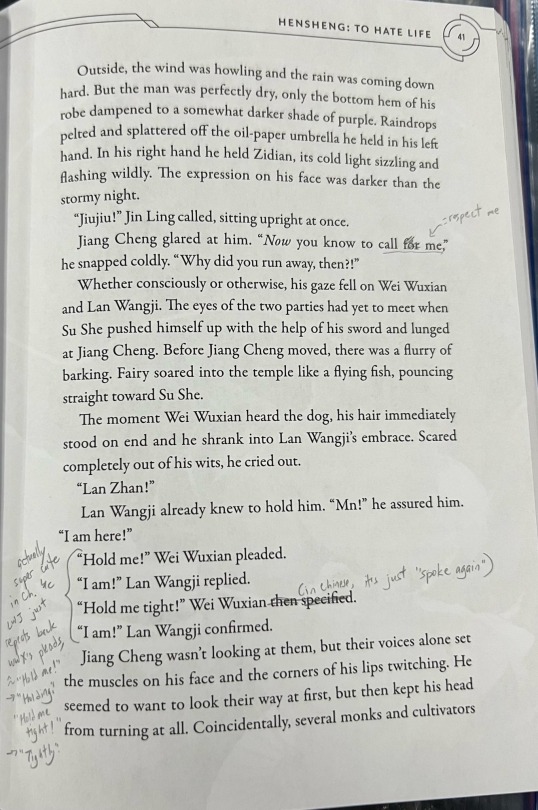
Re my note at the top of this page: I think it’s similar in Western culture (I know I’ve been steeped in xianxia maybe too deeply when I forget the culture that I’m actually living in), but in Chinese culture it’s especially important to greet people by name/title, especially when you first see them, and again when you separate. It’s a simple, sweet way to acknowledge that you see them and respect them and appreciate them and support them; if they need help with homework or with reaching a high shelf, you’re here to help; if you’re the one who gets help and gifts and tasty treats, then you’re showing that you appreciate everything about them (and you’re ready for more cookies).
Each time I walk into my house it’s like a game of hide-and-seek where I have to find each family member and declare my presence (and demand affection in return); and each time I leave I yell “I’m leaving!” from the door (because I’m late and must go quickly!) so that they know that I am no longer available to help, but I will miss them all and love them from afar.

The illustrations are gorgeous. I don’t know if they would be so gorgeous if JC was holding his little umbrella overhead, like in the text, but you must admit that it’s quite a flex that JC can beat up many people with Zidian while keeping his head and shoulders dry.

You all remember the family / martial-family nomenclature, right?
MDZS Masterlist.
All the Books I'm Annotating Masterlist.
More Evidence for How My Favorites are Evil (Geniuses)(but not really evil)
from 杀破狼 Stars of Chaos, Ch 57:
Gu Yun laments not being more decisive about obliterating (murdering) all the evidence that he had previously mostly obliterated; or he should have just collected the evidence and used it to stage a hostile takeover. Sigh. Oh well.
Chang Geng reassures LiaoRan that he won’t attack the emperor (not because being nice is the right thing to do, but) because it’s not the right time.
I’m sure there are plenty of other modern western stories where the main characters are grey, but I just can’t think of any other story where the non-villain-coded main characters are all “darn, I should have murdered that other person” and “don’t worry — I won’t murder until the time is right.”
Ever see a depiction of St. George and the Dragon? It's pretty fair to say if you've seen one, you've seen them all: Georgie on a horse stabbing a flailing dragon creature, princess piously kneeling in the background, vague landscape alluding to the homeland of the artist's patron.
The most varied part is the dragons. No one had a real definition for the thing, it seemed. For your pleasure and entertainment, I have ranked some medieval depictions based on how impressive George's feat seems once you see the dragon.
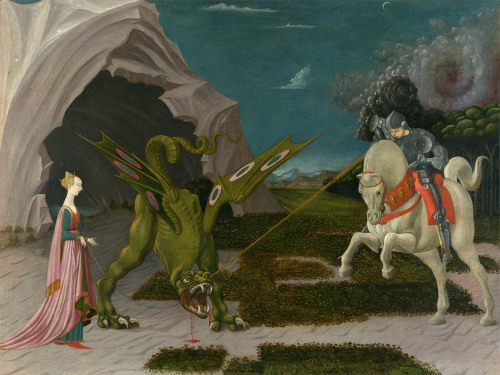
Paolo Uccello, 1456
This is a terrifying beast. The hell is that. Uccello was one of the first experimenters with perspective, so the thing also looks surreal, like it's taking place on Mars, or a Windows 95 screensaver. I would not want to fight that, I would not want to be tied to that. (Sometimes the princess is tied to the dragon for some reason.) 10/10
Horse thoughts: Maybe if I look at the ground it will be gone when I look up
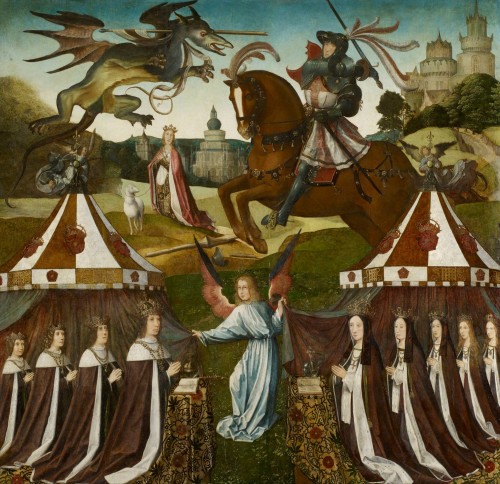
Unknown artist, c. 1505
This is a rare change of form for the dragon; it's the only one I've seen actually flying (or at least falling with style). It doesn't look particularly deterred by the spear through its throat, either. Also, George looks appropriately nervous. On the other hand, it hasn't got teeth, it seems to be fuzzy rather than having scaly armor, and George is bolstered by his army of Henry VII and his children, most of whom definitely didn't actually die in infancy. Still, wouldn't want to fight it, wouldn't want my pet sheep near it. (Sometimes the princess has a pet sheep for some reason.) 9/10
Horse thoughts: I am so glad I wore my mightiest feather helmet for this
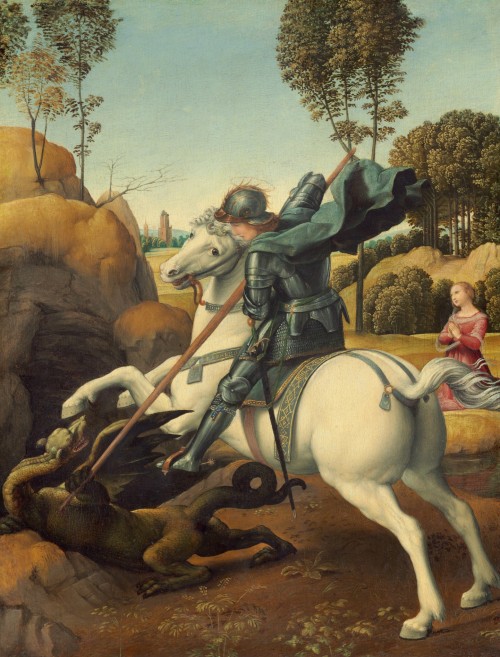
Raphael, 1505
We are coming to Dragons With Problems. This guy looks about comparable in size to George, and does have wings, but doesn't seem to be using these things to his advantage (and has he only got one wing?) And how does he deal with the neck? He does have a comically small head, but holding it up with such a twisty neck seems complicated at best. But most egregiously, he is doing the shitty superheroine pose where he is somehow simultaneously showcasing his chest and his butt, with its unnecessarily defined butthole (more on this later) (regrettably). 8/10 bc it's Raphael
Horse thoughts: AM I THE BESTEST BOI? AM I DOING SUCH A GOOD JOB? WE R DRAGON SLAYING BUDDIEZ
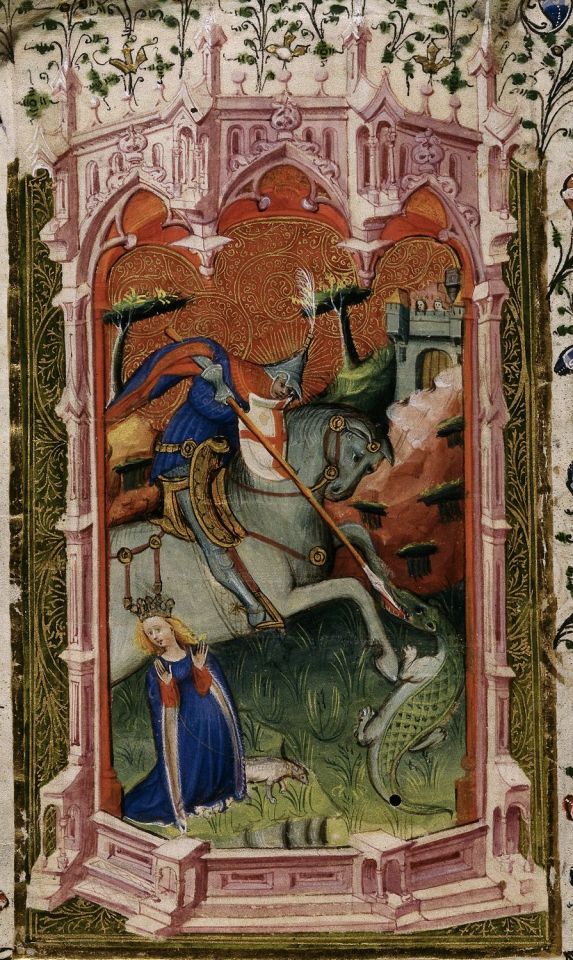
The Beauchamp Hours, c. 1401
We had a spirited debate about this one at work. Again, the dragon has gotten smaller, and this one hasn't got even one wing. He's basically a crocodile. So the debate became: would you want to fight a crocodile if you had a horse and a pointy stick? Would the horse trample the animal, who can't get on its hind legs, or freak out and throw its rider? Would the pointy stick be enough to pierce the croc's thick hide? In this case, George seems to be controlling his horse and putting his pointy stick in the dragon's weak spot, so we can be impressed by his skill and strategy. However, his hat is dumb. 7/10
Horse thoughts: Dehhhh
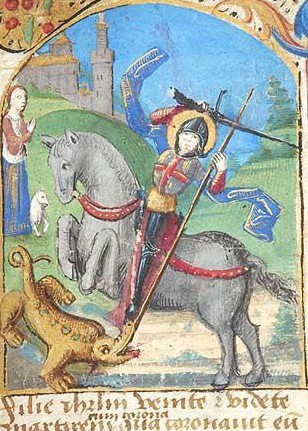
Book of Hours, c. 1480
Here we have the same kind of croco-dragon, but George's focus on his strategy has gone out the window. He's flailing around, not even looking at his target, he's about to lose his pointy stick, he hasn't got a hand on the reins, and his sword seems to only be poking the invisible dragon over his shoulder. All he's got going for him is that his hat is slightly less dumb. 6/10
Horse thoughts: Yay, new friend! Come play with me, new fr- what is happening
Final dragons put behind this Read More for your safety:

Rogier van der Weyden, c. 1432
I'm thinking this guy is at least semi-aquatic. Webbed feet, wings that seem more like fins, bipedal but top-heavy, jaws that seem more for scooping than biting. Maybe she's crawled up here from the nearby body of water to lay her eggs, and this is all a big misunderstanding. Moreover, George's dagged sleeves seem entirely impractical for the situation. 5/10
Horse thoughts: i got my hed stuk in a jar and now it is this way forever

Unknown artist, c. 15th century
I hate this. I hate everything about it. Why has it got human eyes and teeth. Why is its nose melting. Why has it got a dick on its face and balls under its chin. The fin/wings are back but they look even more useless. Also, George is shifty as hell, schlumped over in his saddle with his bowler hat thing over his eyes. The baby dragon at the bottom eating some hapless would-be rescuer is kind of metal. 4/10 at least the thing is gonna die
Horse thoughts: I Have Smoked So Much Crack

Book of Hours, c. 1450
Remember what I said about the buttholes? First, sorry. Second, yeah, we're back to that. I'll admit this one is less about the danger from the dragon itself than the very specific choices the artist has made. They didn't need to do that. It's a lizard. They don't even have. And it's like they had an orifice budget and they skipped an exit wound for the spear to focus. Elsewhere. It's so detailed. And George had an even dumber hat. 2/10 take it away
Horse thoughts: I Have Smoked So Much Weed
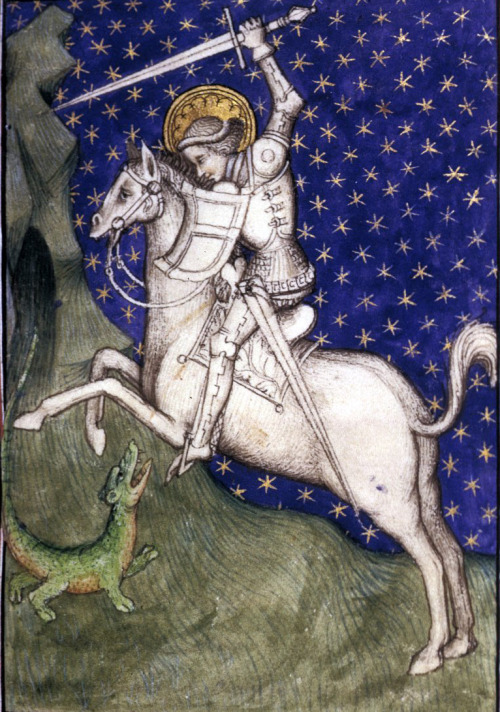
Book of Hours, c. 1415
This is just bullying. There isn't even a princess. That is clearly an infant. Look at that smug look on George's face as he swings his sword that's bigger than the whole little guy. This is the equivalent of when DJT Jr. hunted those sleeping endangered sheep. 1/10
Horse thoughts: ....yikes

And this is the previous one, but now the baby dragon is cute. He's chubby. He's got toe beans. He's Puff the Magic Dragon. His eyes have already gone white, implying that George is just kicking its corpse around for funsies. What's the difference between the dragon and the lamb in the background? That the dragon is dead, like our innocence. This George is truly deserving of the dumbest hat of all. 0/10 plus one more butthole for the road
Horse thoughts: Perhaps it is we who are the buttholes.

This is just The Magnus Institute.
杀破狼 Stars of Chaos:
This book has more plot than I have Chinese reading comprehension, but I think I see it now.
Chapter 52 is where Chang Geng asserts his superior intellect and problem-solving skills (because his vision isn’t clouded by pesky things like emotions for people who aren’t Gu Yun); and Chapter 53 is where he/Priest lays out Chang Geng’s evil master plan to bring peace and prosperity to the nation so that maybe he can convince Gu Yun to take a vacation.
No details or anything; just “this is the problem and that is what must be done.”
Yet more reasons for Why I Love Chang Geng
(even if he is a possibly-evil genius and love-crazed lunatic)
Stars of Chaos 杀破狼 ch 43:
When asked why he was hanging out everywhere but at the capital for the past 4 years, Chang Geng replies
“我……我想看一看,”长庚道,“了然大师以前跟我说过,心有天地,山大的烦恼也不过一隅,山川河海,众生万物,经常看一看别人,低下头也就能看见自己。
“I….wanted to see,” Chang Geng said, “Teacher Liao Ran had told me before, the heart encompasses the sky and the land; even a mountain-sized worry can only occupy one small corner. Mountains, valleys, rivers, oceans; millions of living creatures; often, through looking at other people you can look down and see yourself.
没经手照料过重病垂死之人,还以为自己身上蹭破的油皮是重伤,没灌一口黄沙砾砾,总觉得金戈铁马只是个威风凛凛的影子,没有吃糠咽菜过,‘民生多艰’不也是无病呻吟吗?”
If you’ve never cared for someone with a grave illness who is on the verge of death, you might think that your broken skin was a major injury; if you haven’t drank a mouthful is yellow sand, you would forever believe that a powerful army was a reflection of awe; if you’ve never eaten chaff and swallowed greens, ‘the peasants have difficult lives’ is only a hollow sentiment.”
(Or something like that. This is a crazy novel that I can’t translate, but I do love it so!)
Anyway, it’s gorgeous to see Chang Geng start to take his place in the world.
And it’s so funny to see Gu Yun constantly surprised at him and wondering why it feels so awkward when they’re touching or alone together or touching while alone together ❤️
I now own Stars of Chaos, Vol 1!!! And pre-ordered Vol. 2 while I was out!! Yay!!!

And now, a brief yet pathetic looking-for-sympathy note:
The 南疆山匪 (southern border mountain bandits??) arc is So Hard for me! It’s all “This character who is a friend of that character who you just met is laying a trap for this other character who is a friend of yet another character that you have Not yet met yet, plot plot convoluted plot” with absolutely no kissing and practically no pining and this is exactly why I am re-reading 杀破狼 Stars of Chaos while making a chapter-by-chapter Notes document of Romance Only for future rereads.
My 杀破狼 Romance Only Notes only have a couple of paragraphs from Ch 40, and it doesn’t look like I’ll have much from Ch 41.
This is taking too much discipline to read.
Priest, give me less massacring and more Mutual Magnetism!
MDZS Volume 4 Annotations
Part 10, pages 310 - end
This is it! The last of the annotations for this volume!
Another exhortation to read @boat-full-of-lotus-pods’s translation, and yet more clarifications to make the reading more comprehensible.

Yes, please read
And some more notes under the cut:




MDZS Volume 4 Annotations
Part 9, pages 293 - 309
Here begin The Edits.
My understanding, gleaned almost exclusively from reading tumblr, is that there are at least 3 versions of MDZS:
1) Original serialized story, published as it was written.
2) Cleaned-up story after the story was all done.
(I think this is the version that got published in Taiwan.)
3) Censored version, the only one that you can easily find online these days.
(This is the version that the ♥️Audio Drama♥️ is based on!)
While it’s awesome that Seven Seas didn’t censor MDZS, it’s also very sad that they didn’t incorporate all the sweet extra little scenes and adorable lines that MXTX added when she had to brutally cut out all the blatant physical intimacy (😢 that must have hurt 😢).
Here’s what to add back in, folks!

⭐️ 1)
WWX: “What do you want to do next?” He just barely restrained himself from saying “Whose house are you going to wreck next?”
LWJ furrowed his brow slightly and corrected WWX: “We.”
WWX: “Ok, ok. We.” (As in, “What will we do next, together.”)
LWJ nodded his head, and he even gave WWX the jujubes again. WWX wiped them on his clothes and took a few bites, thinking about how, in the middle of the night, Hanguang Jun wants Yiling Laozu to disturb the peace and make mischief with him.
If word of this got out, it would be disastrous.
Much more below the cut:

⭐️ 2)
After a moment, he tilted his head and asked, “How is it?”
WWX: “Hmm? What? How is it? … Good! Very good. I gladly bow down to your superiority!”
These were true statements. Even though he was drunk, Hanguang Jun’s handwriting was, as usual, exceedingly proper; WWX was ashamed at his own inferiority (re: handwriting) (handwriting is a big thing in Chinese culture).
LWJ nodded his head, and passed Bichen to WWX.
WWX: “…?…”
LWJ again tried to pass Bichen to him, and WWX accepted. He looked at the wall and noticed how there was a lot of space after the words “Lan Wangji,” then understood.
LWJ was waiting for him to write his own name up there!
LWJ stared at WWX unrelentingly, and WWX finally couldn’t take it anymore, saying “Ok, ok, ok. I’m writing. I’m writing.”
Resigned to this action (this fate), in the space after “Gusu LWJ,” he wrote “Yunmeng WWX.” Now, both of their names were side by side on the wall.
“Gusu LWJ, Yunmeng WWX, travelled here!”

⭐️ 3)
The sect rules of Gusu Lan were so strict, there was no way LWJ had ever had so much wild, crazy fun when he was little.

⭐️ 4) (an entire scene of Drunk LWJ exerting his dominance over a dog for the sake of WWX)
“Woof woof woof arf arf arf!”
Suddenly, an torrent of barking exploded like firecrackers in WWX’s ears. He screamed and instinctively jumped on top of LWJ: “Lan Zhan, save me!”
This household raised dogs?
In actuality, in the middle of this quiet night, WWX’s awful hollering and howling was much more terrifying than any dog’s barking. He was scared out of his wits, but LWJ’s expression did not change, and with one hand he held WWX and patted him soothingly, with the other hand he held his sword, then leapt lightly to the top of the wall; and from that position of superior height he looked down upon the wicked dog, and with a cold expression seemed to engage in a confrontation with it.
WWX had all 4 limbs wrapped around LWJ and his face buried in LWJ’s neck. His whole body was stiff, paralyzed. He screamed, “Don’t confront it! Go! Let’s go! Lan Zhan, get me away from here! Aughghghgh!!!”
While WWX was madly crying, the dog, upon seeing LWJ, had tucked its tail between its legs, extended its tongue, lowered its head, and was splayed on the ground crying; it didn’t dare bark anymore.
LWJ saw that he had achieved complete victory, then gently patted WWX twice more, held him tightly, then leapt down from the wall.
They had walked quite a ways away and didn’t hear a single bark; only then did WWX peel himself off of LWJ’s body. His eyes stared straight forward and his legs still trembled. LWJ patted his shoulder, expression focused on WWX as if asking if he was ok. WWX hadn’t fully calmed down yet, and with some effort took a deep breath, casually praising LWJ as he did so: “Hanguang Jun, you really are extraordinarily brave. Unparalleled!”
Hearing this, LWJ seemed to smile.
The moment was fleeting, and WWX thought that perhaps he was just seeing things. He was stunned.
A moment later, he sighed, rubbed his chin, and smiled. “Lan Zhan, now you know to regret not going to Lianhua Wu with me back then, right? Wait! Where are you going?! Don’t just run off!”

⭐️ 5)
WWX couldn’t help but tug on LWJ’s forehead ribbon. “You even order me around now?”

⭐️ 6)
WWX despaired. He gritted his teeth and pretended like everything was fine: “I’ll just help you pour over the bath water, ok? And the rest you can do yourself.” As he spoke, he made to dodge away from LWJ; suddenly, LWJ reached out and ripped off his sash.

⭐️ 7)
Seeing him this way, WWX’s heart inexplicably softened; he also felt it to be funny (Chinese doesn’t require subjects in sentences, so I’m not sure if WWX finds LWJ funny or the situation laughable or both). This person really has been this way since he was little — the things he wants, he would never say in words, but he would fiercely pursue with his actions. So, then, WWX dragged LWJ back to the tub, saying “Ok, I’ll help you bathe. Come here.” In his heart, he thought, “I’ve lost. I admit defeat. Ok, I’ll help him scrub a little — nothing more.”
⭐️ Alright!!
From here, pages 298 - 310, the edits were so many but also so subtle that I can’t just write them in. Instead, I highly highly recommend that you read the translation done by @boat-full-of-lotus-pods :
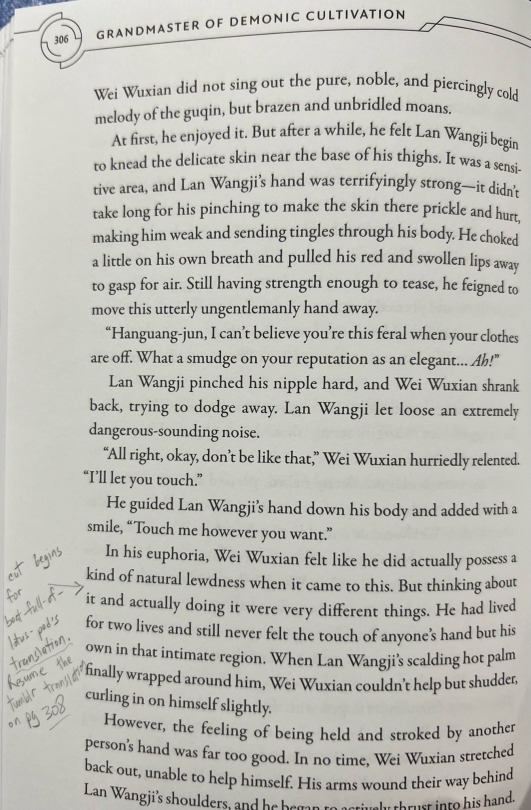


MDZS Volume 4 Annotations
Part 8, pages 267 - 288
More little clarifications :)

The Appendix has a “Time” section, but I always forget what each time period is called, so I wrote the times in here.

下不为例 is an awesome phrase. Nearly-literally, it means “this is not setting an example for the future.” Formally speaking, I’d translate it as “Don’t take this as precedent.” Here, I felt that “Just this once” conveys the feeling of the message best.
(“There will be no next time” is what I threaten my children with when they severely mess up, which is not the case here.)
More under the cut.

Please don’t refer to bone-bits as crumbs. I eat cookie crumbs with a spoon. I smoosh bread crumbs together and pop them in my mouth like little biscuits. I live off brownie crumbs for breakfast.
No bone crumbs, please.







MDZS Volume 4 Annotations
Part 7, pages 236 - 266
More little clarifications and one little rant.

(Lan Wangji wouldn’t use that many words if he could help it :)
More below the cut.







Hold on. I appreciate the beautiful illustration, but you’re illustrating to me that Wen Qing, a trained doctor fully prepared to do a 30+ hour surgery, decided to just lay her patient out on the ground in the open? No tent, no table, no water? No reliable light source?
And where in the world is Jiang Cheng!?!?


MDZS Volume 4 Annotations
Part 6, pages 210 - 234
More anti-slang, and a couple more clarifications.

More under the cut




Ok, so. This is weird, not because it’s incorrect, but because it is correct (but I don’t like using the word “strumpet” here).
The direct translation of “满身风尘” is “whole body wind dust,” implying that you’ve been outside for quite some time and are probably tired and dirty, most probably because of travel -- travel fatigue. Makes sense.
But 风尘 also refers to when women are driven to prostitution, likely because society is unstable or dangerous (like in times of war)(or just when times are hard). 风尘女 is another way to say “prostitute.”
So now I’m not sure whether MXTX was trying to say “besides the fact that the woman looked travel-worn,…”; or if she was saying “besides the fact that the woman looked like a prostitute (who hadn’t worked in 11 years?)(and is in normal clothes?)(and isn’t trying to beguile any new customers, either?),…”; or if she’s just conveniently using a word/phrase that means both at the same time in Chinese.

I don’t know why the translators chose “boy.” The Chinese is 少年, which is pretty obviously “youth” or “young person” or even “teenager,” but is definitely not a child.




MDZS Volume 4 Annotations
Part 5, pages 174 - 208
And so begins my “Please No American Slang!” tirade, plus a few more grammatical / vocabulary changes to make the story flow more clearly.

The Chinese for this is super funny. I could totally see Jin Ling staring at his JiuJiu, staring so hard that JC felt the stare and looked over to see his teenage nephew absolutely googly-eyed as he tried to Jedi-mind-trick / wish his JiuJiu into saying something nice to him.
Jedi mind tricks don’t work on JC, of course. (Wishes don’t work on him, either.)
More below the cut:









MDZS Volume 4 Annotations
Part 4, pages 152 - 174
More notes on MDZS vol 4! A few anti-slang, and then a lot of clarifications of sentences or words that I felt were strange or misleading or not as precise as they could be.

More below the cut!









MDZS Volume 4 Annotations
Part 3, pages 89 - 151.
Some important (I feel) tonal tuning and a little more anti-slang.

More below the cut:









MDZS Vol 4 Annotations
Part 2, pages 51 - 88
Part 2!
Some anti-slang annotations, a few Chinese Family / People Terminology reminders.

Yes, the literal translation is “miraculous.”
No, MXTX is not trying to invoke or reference either Jesus or Marinette Dupain-Cheng.
She’s just trying to show that WWX has fast reflexes.
More below the cut:









MDZS Vol 4 Annotations
Part 1, pages 1-49
I finally finished Book 4! It was beautiful! I loved it! But a lot of word and phrasing choices didn’t fit my personal interpretation of the MDZS world, and the final chapter of Book 4 was translated based on an earlier version of MDZS, so I have a ton of notes.
Alright. Here we go:

The author is very affectionately roasting LWJ here, and simultaneously showing how LXC is an expert at reading his enigmatic little brother. The contrast between the high-register language of the brothers’ conversation vs the relatively informal narrative language is obvious in Chinese, and serves to make this short and otherwise rather somber exchange more interesting and a little bit fun.


I had a hard time with contractions and slang in this book. I’m sure it’s in all the other books, too, but this time the “gonna”s and “gotta”s and “yah”s rubbed me the wrong way.
Every single character in MDZS (except Xue Yang) is highly educated and speaks with care and precision. WWX talks more colloquially than LWJ (or, rather, LWJ speaks like ancient poetry and WWX just talks), and JC tends to punctuate conversations with criticism and threats, but they all speak like they endured years of formal schooling and have hundreds of classical poems and ancient texts memorized.







Ok! Ok. So I’m going at MDZS Vol 4 very very slowly, and it took me until today to remember that other, much more talented people have already translated the updated/online version of Ch 95 (7 Seas ch 20 part 2).
There’s just no way to elegantly annotate Ch 95 — the newer online version has a few deletions and a bunch of little additions, and a few paragraphs that got moved up or down. It’s easier to just read this excellent translation.
Enjoy!
MDZS Chapter 95. “Sleeplessness” Part 6
Love to bathe
[Content Warning: drunk sex]
Lan WangJi ignored him and kept staring, as if afraid that Wei WuXian would run away as soon as he blinked. Wei WuXian reached out a hand to cover his eyes. Lan WangJi ducked half of his face into the water to avoid the hand, blowing out a stream of bubbles into the water. Laughing, Wei Wuxian lightly pinched his cheek and asked, “Er-gege[1], how old are you?”
Keep reading

